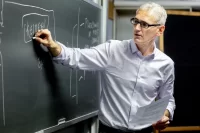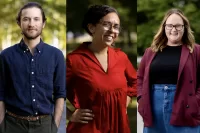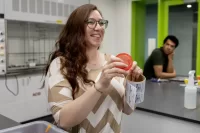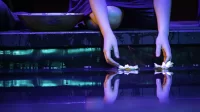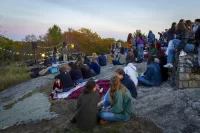
Commencement 2014: Address by Isabel Wilkerson
A transcript of the 2014 Commencement address delivered by Isabel Wilkerson, author of The Warmth of Other Suns.
Good morning. I am thrilled to be with you on this joyous day. I’m so relieved the skies have cooperated with us. Thank you to President Spencer and to the Board of Trustees for inviting me. Congratulations to my fellow honorands. It is a thrill to share this stage with you. Congratulations to every parent, grandparent, sibling and loved one gathered here this morning.
And, most of all, congratulations to the Graduating Class of 2014! It is you, I am told, who jumped into the frozen lake of Lake Andrews — is that not right? — who survived your senior theses and, I’m also told, saw the sunrise on Mount David this morning.
I had heard so much about Mount David that I decided to check it out for myself yesterday, and I discovered that it was more a mound than a mountain. But I went up as far as my high heels would take me, and so I can truly say congratulations to my fellow Bobcats. This is your day.
I have only 15 minutes, and 15 minutes is not really enough time to say all that I wish I could say. It took me 15 years to — I brought a copy of this book I spent all this time on — this is my copy, it’s all worn — it took me 15 years to write the book that got me to this point, and it took so long that I often say that if this book were a human being, it would be in high school and dating, that’s how long it took me to write this.
So, for me, 15 minutes is not a lot of time. But I want to speak with you today about courage, about the courage that it took to create your alma mater, the courage that it took to bring our country into the modern era, and the courage that I know is within you as you leave this campus.
We are in a crisis in our country.
The world that you are entering is one of unimagined opportunity but also a world in peril, and it needs you, the Class of 2014, so very urgently. We are in a crisis in our country: a crisis of identity, a crisis of fairness, a crisis of who is seen as deserving and who is not, a crisis of who is American, or who is seen as American, and what it means to be American and what America should be and can be. And a crisis of what we should do about our tangled inheritance, what we should do about the sins of the past and the injustices of the present.
One reason for all of these crises is that we do not know where we have come from, we do not truly know the cost in human lives and in human blood that it took to create the country that we live in and the fruits that we enjoy. We do not truly know how we came to this moment, and the origins of the divisions of the tribe and caste that plague and handicap us to this day.
This year, the year of your graduation, is a milestone not just for you but for our country. Look at what has happened in the last 50 or 60 years. When your grandparents (and for some of you when your parents) were born, it was actually against the law for a black person and a white person to merely play checkers together in Birmingham. You could go to jail if you were caught playing checkers with a person of a different race.
The very word of God was segregated.
It was against the law for a black person to take out a library book in Mississippi; in living memory, throughout the South, there was actually a black Bible and an altogether separate white Bible to swear to tell the truth on in court. The very word of God was segregated. Throughout the South, black people were publicly executed for trying to vote and white people killed for trying to help them.
We are now on the eve of a watershed moment in that national struggle. Next month, it will be exactly 50 years since three young men your age — James Chaney, 21, Andrew Goodman, 20 and Michael Schwerner, 24 — were abducted and killed by a mob of 18 men in Neshoba County, Mississippi, merely for trying to register African Americans, putatively free American citizens, to vote. It took 40 years for anyone to be brought to justice in that case, and most of the perpetrators never spent a day in jail.
It was the national outrage over their deaths, combined with the courage of thousands of young protesters of all races, that helped propel the Civil Rights Act of 1964, outlawing discrimination in employment and in public spaces, along with the Voting Rights Act of 1965, protecting a citizen’s right to vote. Which means that, if you know someone born before 1965, you know someone who was not born in a democracy. Think about that. Because until that time, millions of American citizens were prohibited from voting.
And yet, in the time since you have been in college, in four short years, many of these advances have been dismantled.
The Voting Rights Act, signed after the sorrow of Chaney, Goodman and Schwerner, has been gutted. And we have gone from the triumph of the 1960s when the country became a true democracy — by opening doors for women, for black people, for non-European immigrants and for the disabled — to the now coarser, harsher public discourse of today, with one racially charged case after another making headlines, with crude racial outbursts by public figures and with worsening disparities between blacks and whites in every sphere of life — from education to employment to housing and income to incarceration rates, all of them deep scars of ancient wounds that have not been confronted, much less healed.
These ancient wounds are our inheritance to face up to, to repair and to learn from. The wounds come from the divisions, fears and hatreds that created 246 years of enslavement of one set of people by another. That means 12 generations. These divisions led the country to civil war. They led to 100 years of legal subjugation of one set of people by another well into the 20th century and unspeakable violence and heartbreak for millions of people still alive today. These divisions have been passed from one generation to the next into our current day. They have led to disparities in the life chances of a good portion of our population and made our entire country weaker for it.
Your alma mater, Bates College, was founded out of a desire to end these divisions, founded in the darkest hours before the Civil War by abolitionists who dreamed a world different than the one they had been born to, who welcomed the potential of people who did not look like themselves. And as you know, Bates was the first college in New England to admit women and one of the first to admit people of color. At Bates, you have proven that you can do well and do good at the same time.
“The brotherhood of man in every condition.”
When the Civil War broke out, half the freshman class volunteered to fight for the Union to abolish the sin of slavery, marching from Hathorn Hall to the railway station to the music of drum and fife.
And it was one of the earliest black graduates of Bates, Thomas James Bollin, Class of 1879, who came up with a beautiful definition of equality that could be a standard for today. He said that social equality “is not equal rights before the law…” (of course that is what he would have been seeking) “is not the equality of riches…” (which he would also have liked) “nor an equality in the simple right of franchise…” (which they were fighting for at that time). He said no, “Social equality is the brotherhood of man in every condition.”
I, too, would ask that we spend less time dwelling on what makes us different and more on what makes us so much the same, on our mutual commonality, what binds us together in our humanity, in our imperfections, in our Americanness, in our love and devotion, dreams and desires, the things that connect us all.
One of the great tragedies of the 20th century was how our ancestors were pitted against one another. That millions of hopeful people arrived to our great cities from across the Atlantic, from across the Pacific, from across the Rio Grande and across the Mason Dixon line during the Great Migration.
These were all rural people far from their farms and hamlets trying to make a way for themselves in these big anonymous cities. They were our parents, our grandparents, our great-grandparents and they were all the same people. Many had not been outside the counties into which they had been born. They all had the same fears and the same courage, many of them fleeing persecution, whether the pogroms of Europe or the lynchings of Mississippi. But when they got here, they were divided up based on what they looked like, the languages that they spoke, the places which they had come from. Some were permitted into unions, others were denied admittance. Some could move where they wished. Others were shut out by restrictive covenants and mob violence.
A truth and reconciliation commission to examine our hard and interwoven history
We still live with the effects of these divisions to this day. There is currently a debate raging in intellectual circles as to whether we should study the idea of reparations for past and continuing discriminations against the lowest caste people in our country. We don’t know what will come of it, or if there will be a study, but I am in favor of anything that gets us talking about what has gone unsaid for so long. I truly believe that we need a truth and reconciliation commission to examine our hard and interwoven history so that we can heal and prosper as one. And it is my hope, and I believe the hope of our country, that your generation finds a way finally to put an end to these divisions.
It will take courage to wrestle with the ghosts of the past and the divisions of the present, the kind of courage that I heard about from a colleague I once knew. A few years ago, I was having lunch with this colleague, a sandy-haired Midwesterner, who was senior to me and who I did not know very well. We were talking about the wonders of teaching when the conversation took a sudden, unexpected turn. For some reason, he felt the need to share with me a deep tragedy within his family. Nearly all of the children in his family had been abused growing up.
The abuse had been so grave and had gone on for so long that it had torn the family apart. Relatives had stopped speaking to one another for decades.
“It ends right here with me.”
The man told me that when he and his wife had their first child, he had to confront the darkness that had ruined the lives of so many children in his family. He looked into the crib at their beautiful and innocent newborn and held the baby close to his chest. He recalled the generations of abuse that he had gone on before him. He was a good man, but, in his veins coursed the blood of people who had done grievous things for generations. And he made a vow as he held that newborn. “It ends right here,” he said. “It ends right here with me.”
He ended up keeping that vow and having a close, loving and fulfilling relationship with his now-grown children, a blessing denied the ancestors who had done so much harm. The abuses of the past had not been his fault or his doing, and the entire family had suffered for it. But he took it upon himself to be the one to end it. It takes courage to confront what has gone before you and more courage still to end an injustice and set a new course.
That is the choice before you and your generation. It may not be all that you do, but I hope that it will be one of the things that you will do on your journey. I hope that you will get see the majesty of the Grand Canyon and the Serengeti, inhale the celestial scent of a Daphne, taste dim sum in Singapore, hear the mating call of a nightingale, create a better app for autocorrect — please! — and know true love.
No matter what course your life takes, there is but one thing that you absolutely must do before you leave this planet. You must make it a better place than it was before you got here. You must leave this world a better place than it would have been if you had not existed, fortunately or unfortunately, that is actually not as difficult a task as it sounds. Wars, poverty, inequality, intolerance, child abuse, climate change, sickness, disease, social injustice — there are so many challenges that we face, the world needs you now more than ever.
One of the most revered alumni to walk this campus was a man named Benjamin Elijah Mays, Class of 1920. He was living proof of how far you can go from where you stand today. He was the son of former slaves who became sharecroppers in South Carolina. His parents had not been taught to read and yet he journeyed to Bates for an education. He went on to get his Ph.D., become a renowned theologian, mentor to Dr. Martin Luther King Jr. and a college president. He had a beautiful way of describing the goal of life. He said:
“To be able to stand the troubles of life, one must have a sense of mission and the belief that God sent him or her into the world for a purpose, to do something unique and distinctive, and that if he does not do it” (if he or she does not do it) “life will be worse off” (and I would add the world will be worse off) “because it was not done.”
And as you go forth to make this world a better, fairer, more compassionate, kinder and peaceful place, I hope that you will remember that you have the courage within you to do wondrous things, miracles even. Congratulations and God bless you all!
